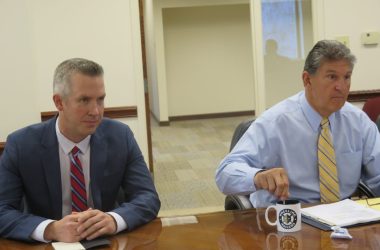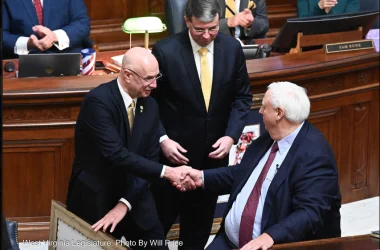By RUSTY MARKS
The State Journal
CHARLESTON, W.Va. — Coalwood native Homer Hickam may be best known as a NASA scientist and author of the best-selling novel “Rocket Boys.”

But the STEM education supporter returned to West Virginia recently to meet with Gov. Jim Justiceand his staff about something else he sees as important — continued state funding for the arts in the Mountain State, including Theatre West Virginia and fairs and festivals like the annual October Sky Festival, which celebrates the history Hickam laid out in his novel.
“We wanted to make sure our little line item stays in the budget,” Hickam said during a March 20 interview at the state Culture Center in Charleston. “It’s not much money, and it means a lot to the state.”
Cuts to fairs and festivals were on the chopping block during the 2016 legislative session. Faced with a projected deficit of $450 million for the fiscal year that begins in July, Justice’s initial budget proposal for this legislative session included the elimination of funding for West Virginia Public Broadcasting, as well as cuts to fairs and festivals and the West Virginia Film Office.
Those kinds of cuts, Hickam said, would be a mistake.
“Especially in this state, which has such a rich history of the arts, when we’re down a bit economically, we’d better not let these things go,” he said. “Most people don’t know all of the artists and singers and musicians who have come out of West Virginia.”
He also said arts and cultural opportunities are important to the state’s economy and quality of life.
“Anyone coming to the state needs to see and do the same things they were able to do in New York or California or wherever they came from, at least on some level,” Hickam said. “That’s one of the things we need to make sure we don’t do without.”
Delegate Mike Pushkin, D-Kanawha, agrees.
“Arts add to the quality of life,” said Pushkin, who sings and plays guitar. “Arts are an investment that always pays back tenfold into the economy.
“In every part of the state, we have these fairs and festivals that mean so much in the local communities,” he said. “It’s not a giveaway. It’s an investment.”
But while Justice has asked the Legislature to restore funding for West Virginia Public Broadcasting — including the nationally and internationally syndicated “Mountain Stage” radio show — funding for other public arts projects such as fairs and festivals remains uncertain.
Justice administration Communications Director Butch Antolini said the governor intends to provide funding for fairs and festivals in his “Save Our State” budget proposal presented to the Legislature. Justice has suggested festival funding could be done through the state Division of Tourism, for which he has requested budget increases.
But there is no guarantee the House of Delegates and Senate will act on the request. Republican leaders in both chambers have vastly different ideas on how to balance the state budget and move the state forward than the Democratic governor.
House Finance Committee Chairman Delegate Eric Nelson, R-Kanawha, and Senate Finance Committee Chairman Sen. Mike Hall, R-Putnam, are under the impression that Justice’s proposed budget includes no direct funding for fairs and festivals.
But that doesn’t mean the Republican-led Legislature won’t fund the arts.
“Public Broadcasting is back in the budget that I proposed,” said Hall, who plays the guitar and resumed taking piano lessons at the age of 31. “I think music and the arts are important to education.”
“I grew up going to Sunrise Museum (in Charleston),” said Nelson, who is on the governing board for the The Clay Center for the Arts & Sciences of West Virginia. “The arts are one of those services that are critical to the citizens of the state.
“My intention is to make sure there is some restoration of fairs and festivals (in the budget).”
Many lawmakers think arts funding is important. Delegate Mike Folk, R-Berkeley, is a pilot, “but I also believe in the value of a classical education, and that includes the arts.”
On the other hand, Senate President Mitch Carmichael, R-Jackson, said in tough budget times, cutting funding for the arts is better than cutting health care or education.
Karnes, whose children are home-schooled, said his kids play musical instruments. But, he added, “(The arts) aren’t nearly as important as things like funding for education.
“There are things you’d call critical, things you’d call important and things you’d call luxuries,” Karnes said.
Public arts funding may be threatened on more than just a state level. The federal budget proposed by President Donald Trump eliminates federal money for the Corporation for Public Broadcasting, the National Endowment for the Arts and the National Endowment for the Humanities.
“Can we really continue to ask a coal miner in West Virginia or a single mother in Detroit to pay for these programs?” White House Budget Director Mick Mulvaney asked in defending the proposed cuts.
But Susan Hogan, chairwoman of the Friends of West Virginia Public Broadcasting, said West Virginia coal miners do support the arts. When Justice first announced the elimination of funding for public broadcasting in the state, tens of thousands of people called their public radio and television stations with pledges of support, and also contacted lawmakers and the governor’s office.
“That is something that shakes people up, when you start taking things away,” she said. She attributes public support for convincing Justice to restore funding for public broadcasting.
On a national level, Hogan said U.S. Sens. Shelley Moore Capito, R-W.Va., Joe Manchin, D-W.Va., and U.S. Rep. David McKinley, R-W.Va., have all come out publicly in support of public broadcasting.
“As far as what President Trump’s office is doing, I liken it to what happened here (with Justice and the Public Broadcasting budget),” Hogan said.
Hogan is optimistic public arts funding will remain on both the state and national levels.
“We’ll have to be patient, yet vigilant,” she said.
See more from The State Journal



